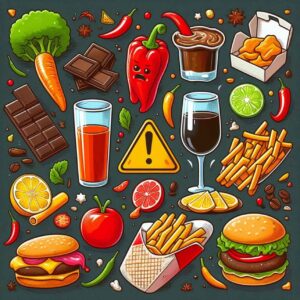Welcome Blessings!
(Tap 🔽 to see more topics!)


Acid reflux is an unwelcome guest at the dinner table who seems to know when to crash the party. It’s that familiar burn, that feeling like your last meal is trying to make a hasty, fiery escape. Look, most of us have felt that uncomfortable surge at some point. It’s a common human experience, a shared annoyance that cuts across all kinds of people.
Think of your stomach as a tightly sealed container, like a soda bottle. When it’s working right, everything stays put. But sometimes, that seal gets a little wonky. Imagine shaking that soda bottle and then popping the cap too quickly. That fizz, that rush? That happens when stomach acid, which is supposed to stay down, takes a detour up into your esophagus, the tube connecting your mouth to your stomach.
Now, heartburn here and there is pretty standard. But it might be something more when it starts happening all the time when it becomes a regular guest at your dinner table. That’s when we’re talking about GERD, or gastroesophageal reflux disease, which is acid reflux that’s become a chronic problem. And yeah, it can lead to some not-so-fun complications.
But before you start picturing the worst, let’s discuss some simple ways to face this. We’ll walk through easy changes you can make in your daily routine, natural remedies that might be the ticket, and, most importantly, when to talk to your doctor. Let’s get that fire under control and make you feel comfortable again!
Before we discuss the solutions, let’s figure out what’s causing your acid reflux in the first place. It’s not just about what you eat—it’s about how you eat, your habits, and even your stress levels.
1. Dietary Triggers
2. Eating Habits
3. Being Overweight or Pregnant
4. Stress and Anxiety
5. Smoking and Alcohol
Yeah, vinegar is like the stuff you put on salads. It might seem weird because you’d think adding acid would make it worse, but hear me out.
How it works: Some people find that a teaspoon of apple cider vinegar mixed into a glass of water can help balance the acid in your stomach. It’s like it tricks your stomach into thinking it has enough acid so it stops producing so much.
How to try it:
Important note: It’s not a magic bullet. If you have severe reflux or ulcers, this might not be the best option, and you should always talk to your doctor.
We talked about that surprising vinegar trick. Let’s switch gears to something warm and comforting: ginger tea. Think of it as a soothing remedy for your stomach. Do you know how ginger ale is often recommended for upset stomachs? Well, ginger tea takes that idea and makes it even better. It’s a natural way to calm things down when that acid reflux starts acting up.
Why ginger works: Ginger has natural anti-inflammatory properties. That means it can help reduce the irritation and inflammation in your esophagus caused by the acid coming back up.
How to make ginger tea:
When to drink it: Sipping ginger tea after meals or when you feel heartburn coming on can help.

A little heads up: While ginger is generally safe, talk to your doctor first if you’re on blood-thinning medications.
Next is aloe vera juice. You know, that stuff you put on sunburns? It can also be a friend to your irritated esophagus. When acid reflux hits, it’s like your throat lining is having a bad day. Aloe vera juice can help calm that down, like how it cools down a sunburn.
How it helps: Aloe vera has natural anti-inflammatory properties, so it can soothe the burning and irritation caused by stomach acid. It creates a protective layer.
How to use it:
Important considerations:
This one might sound odd, but hear me out: chewing gum. Yep, that simple stick of gum you grab at the checkout. It can help with acid reflux. It’s not about the flavor or the brand; it’s about the act of chewing itself.
How it works:
How to use it:
Things to remember:
Next is baking soda, a classic kitchen staple that some people swear by for acid reflux. This one comes with a few important caveats, so listen closely. Baking soda, or sodium bicarbonate, is naturally alkaline. It can neutralize stomach acid, so some find it provides quick relief.
How it works:
How to use it:
Important warnings:
Baking soda can be a quick fix in a pinch, but it’s not something you should rely on regularly. Always consult with a healthcare professional before frequently using baking soda. They can help you find a safe and effective way to manage your acid reflux.
You probably know chamomile tea as a sleep aid, but it has some properties that can help ease acid reflux.
How it works:
How to make chamomile tea:

When to drink it:
Gentle reminder:
Bananas are a gentle, easy-to-digest food that can help soothe acid reflux.
How they help:
How to use them:
Things to keep in mind:
Okay, this one’s a wildcard: mustard. You might be surprised to hear that some people reach for a spoonful of yellow mustard when acid reflux strikes. It’s one of those home remedies that pops up occasionally, but it’s essential to understand that the evidence is mainly anecdotal. Many people say it works for them, but there’s not much solid scientific proof.
Potential benefits:
Important considerations:
How people use it:
While some people swear by it, mustard isn’t a proven solution. If you want to try it, do so cautiously and be mindful of your sodium intake. If your acid reflux is frequent or severe, consult a healthcare professional.
Alright, we’ve talked about some natural remedies, but sometimes, you need to make some lifestyle tweaks to get that acid reflux under control. It’s not always about quick fixes; it’s about making changes that stick. If your house is always messy, you can’t just clean one room and expect everything to be perfect. You’ve got to make some overall adjustments.
1. Eat smaller, more frequent meals
2. Avoid trigger foods
3. Don’t eat too close to bedtime
4. Elevate your head
5. Maintain a healthy weight
6. Quit smoking
7. Wear loose-fitting clothing
8. Manage stress
These changes might take time and effort, but they can make a huge difference in how you feel.

While home remedies and lifestyle changes work for many, sometimes acid reflux can be a sign of a more serious issue. If you experience the following, it’s time to consult a doctor:
1. Does drinking milk help acid reflux?
2. Is acid reflux the same as heartburn?
3. Can exercise make acid reflux worse?
4. What’s the best sleeping position for acid reflux?
5. Can drinking water help?
You don’t have to live with that burning feeling. Acid reflux doesn’t have to run the show. You have some fundamental tools at your fingertips, and it’s all about finding what works for you. Simple stuff, like eating smaller meals, skipping that late-night pizza, and propping yourself up when you sleep? Those little tweaks can make a world of difference.
And those natural helpers we talked about, like ginger tea or a ripe banana? They’re there to lend a hand. But listen, if you’re still feeling that fire, or if things worsen, please consult your doctor. It’s always better to be safe. They can help you figure out the best way to keep your stomach happy and healthy.
Want to start making these changes today? Try one of the natural remedies or lifestyle changes mentioned above and see how you feel. Your gut will thank you! Voila! Until next time!
Additional References/ Further Readings:
Khandouzi, N., Shidfar, F., Rajab, A., Rahideh, T., & Hosseini, P. 2020. Ginger in Gastrointestinal Disorders: A Systematic Review of Clinical Trials. Food Science & Nutrition, 8(8), 3987–4005. https://pubmed.ncbi.nlm.nih.gov/32328282/
Moore, M. 2018. Diet and Lifestyle Changes in Managing GERD. Gastroenterology Nursing, 41(4), 313–315. https://journals.lww.com/gastroenterologynursing/Abstract/2018/07000/Diet_and_Lifestyle_Changes_in_Managing_GERD.3.aspx
Surjushe, A., Vasani, R., & Saple, D. G. 2015. Aloe Vera: Potential Candidate in Health Management via Modulation of Biological Activities. Pharmacognosy Reviews, 9(17), 120–126. https://www.ncbi.nlm.nih.gov/pmc/articles/PMC4557234/
Srivastava, J. K., Shankar, E., & Gupta, S. 2010. Chamomile: A Herbal Medicine of the Past with Bright Future. Molecular Medicine Reports, 3(6), 895–901. https://www.spandidos-publications.com/mmr/3/6/895
Healthline. (n.d.). Baking Soda for Heartburn: Effectiveness and Risks. https://www.healthline.com/health/baking-soda-for-heartburn
Mayo Clinic. (n.d.). Gastroesophageal Reflux Disease (GERD). https://www.mayoclinic.org/diseases-conditions/gerd/symptoms-causes/syc-20361940
National Institute of Diabetes and Digestive and Kidney Diseases (NIDDK). (n.d.). Acid Reflux (GER & GERD) in Adults. https://www.niddk.nih.gov/health-information/digestive-diseases/acid-reflux-ger-gerd-adults